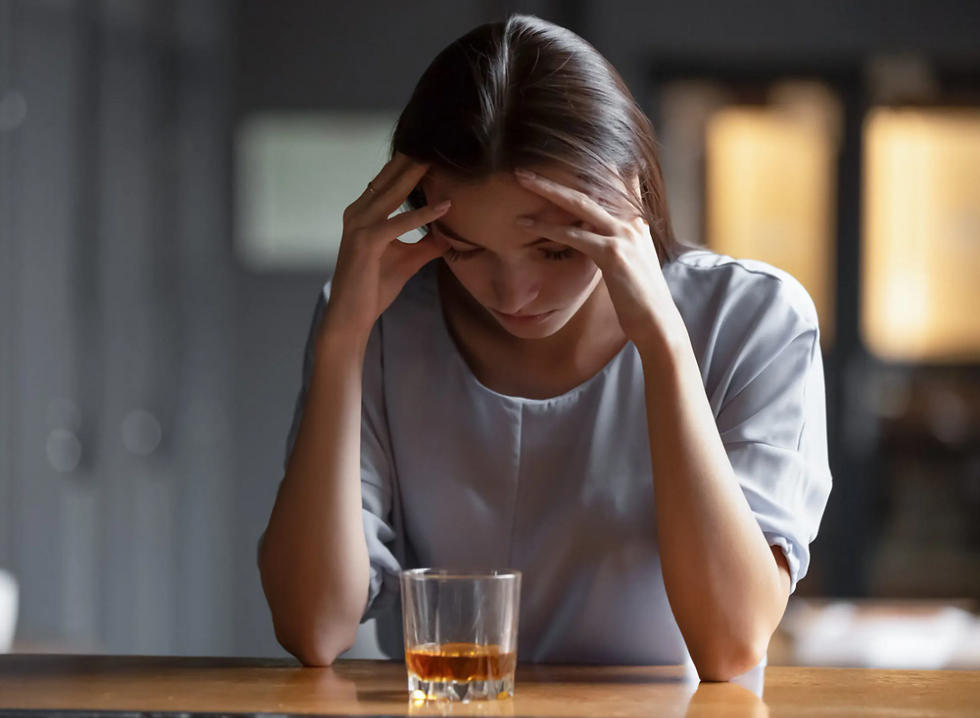Alcohol and Anxiety: What You Need to Know
- Muhammad Wasim
- Aug 15, 2025
- 3 min read
Anxiety is one of the most common mental health struggles worldwide, affecting millions of people every year. For many, alcohol might seem like an easy way to “take the edge off” after a stressful day. While it may provide temporary relief, alcohol and anxiety are more closely linked than most people realize — and not in a good way. Understanding how drinking impacts your mental health can be the first step toward breaking the cycle and finding healthier coping strategies.
The Connection Between Alcohol and Anxiety
Alcohol is a central nervous system depressant, meaning it slows brain activity. In small amounts, it can create feelings of relaxation and lower inhibitions. However, alcohol also disrupts brain chemistry, particularly the balance of neurotransmitters like serotonin and GABA, which regulate mood and anxiety.
When the effects wear off, your brain may rebound with increased nervous system activity, leading to heightened anxiety, often called “hangxiety” — anxiety experienced after drinking.

Short-Term Effects of Alcohol on Anxiety
In the short term, drinking may feel like it helps you cope, but here’s what’s really happening:
Temporary Calm – Alcohol slows down the brain, making you feel relaxed.
Lower Inhibitions – You may feel more social or confident.
Rebound Anxiety – Once alcohol leaves your system, your body produces more stress hormones like cortisol, triggering anxiety symptoms.
Disrupted Sleep – Poor sleep after drinking can also increase anxiety levels the next day.
Long-Term Effects: Why Alcohol Worsens Anxiety Over Time
Regular or heavy drinking can:
Change brain chemistry so your natural anxiety regulation becomes weaker.
Increase risk of panic attacks and social anxiety.
Make you depend on alcohol for emotional regulation.
Lead to alcohol-induced anxiety disorder even in people who didn’t have anxiety before.
Alcohol Withdrawal and Anxiety
When someone who drinks regularly stops or cuts down, withdrawal symptoms can appear. Anxiety is one of the most common:
Mild withdrawal anxiety may feel like restlessness, worry, or an unsettled stomach.
Severe withdrawal anxiety can include intense panic attacks, racing heart, sweating, and insomnia.
If you’re considering stopping after heavy drinking, always seek medical guidance — withdrawal can be dangerous without support.
Breaking the Alcohol-Anxiety Cycle
The alcohol-anxiety cycle often looks like this:
You feel anxious or stressed.
You drink to calm down.
The alcohol wears off, and anxiety comes back stronger.
You drink again to relieve the anxiety.
Breaking this cycle requires replacing alcohol with healthier coping strategies that truly address anxiety rather than masking it.
Healthier Ways to Manage Anxiety Without Alcohol
Exercise – Physical activity releases endorphins and lowers stress hormones.
Mindfulness & Meditation – Helps calm racing thoughts and build emotional resilience.
Journaling – Writing down worries can help release mental tension.
Deep Breathing Exercises – Simple breathing techniques can lower anxiety within minutes.
Therapy or Coaching – Cognitive Behavioral Therapy (CBT) and Acceptance & Commitment Therapy (ACT) are highly effective for anxiety.
Nutrition & Hydration – Balanced blood sugar and proper hydration improve mood stability.
When to Seek Professional Help
If anxiety is impacting your daily life, or if you notice you’re drinking more to cope, it’s time to reach out for help. Professional support can guide you in reducing alcohol safely, managing anxiety with proven techniques, and building a healthier lifestyle.

How Sobriety Sisterhood Can Help
If you’re struggling with the cycle of alcohol and anxiety, you don’t have to face it alone. Sobriety Sisterhood is a supportive, women-focused community designed to help you break free from alcohol’s hold and reclaim your mental well-being.
Founded by Ellen, a certified coach with expertise in exercise physiology, nutrition, trauma-informed care, and positive psychology, Sobriety Sisterhood offers:
Personalized coaching to address both alcohol use and anxiety triggers.
Peer support from women who understand your journey and offer encouragement without judgment.
Evidence-based strategies like mindfulness, habit building, and emotional resilience training to replace alcohol with healthy coping tools.
Online community & retreats where you can connect, learn, and grow in a safe, empowering environment.
By joining Sobriety Sisterhood Coaching, you’ll not only learn how to manage anxiety without alcohol — you’ll gain the confidence, clarity, and connection needed to thrive in every part of your life.
While alcohol might seem like a quick fix for anxiety, it’s actually fueling the problem. Understanding the link between alcohol and anxiety empowers you to make choices that protect your mental health. Whether you choose to cut back or stop drinking altogether, the benefits for your mind, body, and emotional well-being can be life-changing.
Remember: True calm and confidence come from addressing anxiety at its root — not from what’s in your glass.
.png)



Comments